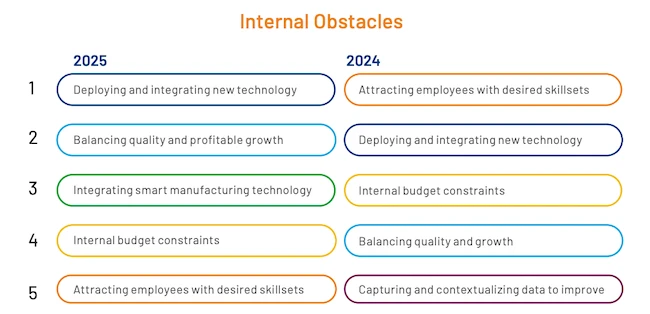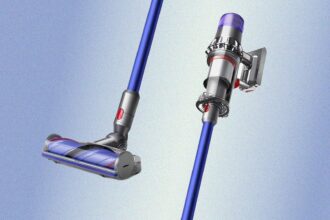The manufacturing sector is entering a new phase of digital transformation. According to Rockwell Automation’s 10th Annual State of Smart Manufacturing Report, 56% of manufacturers are piloting smart manufacturing initiatives, 20% have deployed them at scale, and another 20% are planning future investments.

While energy costs have become less of a concern for manufacturers, cybersecurity risks, competition, and workforce challenges have risen in prominence. Alongside inflation and economic uncertainty, these factors are now among the top obstacles manufacturers expect to face over the next year.
### AI’s role in smart manufacturing
Manufacturers are focusing on reducing risk. They are looking for solutions that combine automation, AI, and secure systems from edge to cloud to keep operations running smoothly, lower exposure to cyber and compliance risks, and build the resilience needed to handle uncertainty.
50% the manufacturers surveyed said they plan to use AI and ML to support quality control within the next 12 months.
### Companies look for smarter ways to manage supply chains
Manufacturers are facing dynamic market conditions, internal and external obstacles, and tight margins. These pressures are pushing companies to look for smarter, ways to run their supply chains. 28% of organizations are actively evaluating their critical suppliers to respond to external risks, which means they are rethinking sourcing, pricing, and overall costs.
The challenges manufacturers face, both inside their organizations and from outside forces, are speeding up digital transformation, according to 81% of respondents.
Cloud and SaaS platforms along with AI continue to rank as the top technology investments, followed by cybersecurity and quality management. Cloud and AI are delivering value in supporting smart manufacturing, while cybersecurity and quality management are seen as key to building resilience and improving return on investment.
Even though companies are collecting more data than ever, 44% of it is being used effectively. This gap shows that gathering data is easier than turning it into actionable insights. Still, many organizations are using their data to strengthen security and operational resilience. 37% are leveraging data from technology, processes, and devices to protect against cyber threats, while 29% use analytics to monitor supply chain risks.
### Smart manufacturing requires more skilled people
Manufacturers continue to point to a lack of skilled workers as the main reason they might struggle to stay ahead of the competition. To tackle this, 41% are turning to AI and ML and automation to help fill the skills gap and address labor shortages.
The shift to smart manufacturing is driving demand for more people with AI and cybersecurity skills. Manufacturers say AI will have the biggest impact on workforce challenges. By investing in technology, companies can move skilled workers to higher-value tasks, boosting productivity. Process optimization is one of the top three ways organizations plan to use AI and ML in the next 12 months.
Manufacturing decision makers expect these technologies to save time by 2027 by reducing manual work and freeing up staff to focus on more important activities.
### Cybersecurity risks continue to rise
Cybersecurity has risen to the number two spot among external obstacles to growth this year. As AI use grows, the potential for cyberattacks is also increasing.
Manufacturers are looking for the right mix of skilled people and technology to strengthen their security. As a result, cybersecurity is becoming one of the top skills employees need. Over the next five years, the most important workforce skills will combine AI knowledge, cybersecurity expertise, and strong problem-solving and critical thinking abilities.
Nearly half of manufacturers, 49%, plan to use AI and ML for cybersecurity, up from 40% in 2024. At the same time, 38% are using data from technology and processes to protect against cyber threats, up from 31% last year.
“In the next 12 months, AI and ML will shape quality control, cybersecurity, and process optimization, ensuring we can take full advantage of accurate, timely data,” said Blake Moret, CEO of Rockwell Automation.
According to Rockwell Automation’s 10th Annual State of Smart Manufacturing Report, 56% of manufacturers are piloting smart manufacturing initiatives, 20% have deployed them at scale, and another 20% are planning future investments.
While energy costs have become less of a concern for manufacturers, cybersecurity risks, competition, and workforce challenges have risen in prominence.
Cloud and AI are delivering value in supporting smart manufacturing, while cybersecurity and quality management are seen as key to building resilience and improving return on investment.
Smart manufacturing requires more skilled peopleManufacturers continue to point to a lack of skilled workers as the main reason they might struggle to stay ahead of the competition.
The shift to smart manufacturing is driving demand for more people with AI and cybersecurity skills.
The manufacturing sector is entering a new phase of digital transformation. According to Rockwell Automation’s 10th Annual State of Smart Manufacturing Report, 56% of manufacturers are piloting smart manufacturing initiatives, 20% have deployed them at scale, and another 20% are planning future investments.

While energy costs have become less of a concern for manufacturers, cybersecurity risks, competition, and workforce challenges have risen in prominence. Alongside inflation and economic uncertainty, these factors are now among the top obstacles manufacturers expect to face over the next year.
AI’s role in smart manufacturing
Manufacturers are focusing on reducing risk. They are looking for solutions that combine automation, AI, and secure systems from edge to cloud to keep operations running smoothly, lower exposure to cyber and compliance risks, and build the resilience needed to handle uncertainty.
50% the manufacturers surveyed said they plan to use AI and ML to support quality control within the next 12 months.
Companies look for smarter ways to manage supply chains
Manufacturers are facing dynamic market conditions, internal and external obstacles, and tight margins. These pressures are pushing companies to look for smarter, ways to run their supply chains. 28% of organizations are actively evaluating their critical suppliers to respond to external risks, which means they are rethinking sourcing, pricing, and overall costs.
The challenges manufacturers face, both inside their organizations and from outside forces, are speeding up digital transformation, according to 81% of respondents.
Cloud and SaaS platforms along with AI continue to rank as the top technology investments, followed by cybersecurity and quality management. Cloud and AI are delivering value in supporting smart manufacturing, while cybersecurity and quality management are seen as key to building resilience and improving return on investment.
Even though companies are collecting more data than ever, 44% of it is being used effectively. This gap shows that gathering data is easier than turning it into actionable insights. Still, many organizations are using their data to strengthen security and operational resilience. 37% are leveraging data from technology, processes, and devices to protect against cyber threats, while 29% use analytics to monitor supply chain risks.
Smart manufacturing requires more skilled people
Manufacturers continue to point to a lack of skilled workers as the main reason they might struggle to stay ahead of the competition. To tackle this, 41% are turning to AI and ML and automation to help fill the skills gap and address labor shortages.
The shift to smart manufacturing is driving demand for more people with AI and cybersecurity skills. Manufacturers say AI will have the biggest impact on workforce challenges. By investing in technology, companies can move skilled workers to higher-value tasks, boosting productivity. Process optimization is one of the top three ways organizations plan to use AI and ML in the next 12 months.
Manufacturing decision makers expect these technologies to save time by 2027 by reducing manual work and freeing up staff to focus on more important activities.
Cybersecurity risks continue to rise
Cybersecurity has risen to the number two spot among external obstacles to growth this year. As AI use grows, the potential for cyberattacks is also increasing.
Manufacturers are looking for the right mix of skilled people and technology to strengthen their security. As a result, cybersecurity is becoming one of the top skills employees need. Over the next five years, the most important workforce skills will combine AI knowledge, cybersecurity expertise, and strong problem-solving and critical thinking abilities.
Nearly half of manufacturers, 49%, plan to use AI and ML for cybersecurity, up from 40% in 2024. At the same time, 38% are using data from technology and processes to protect against cyber threats, up from 31% last year.
“In the next 12 months, AI and ML will shape quality control, cybersecurity, and process optimization, ensuring we can take full advantage of accurate, timely data,” said Blake Moret, CEO of Rockwell Automation.



